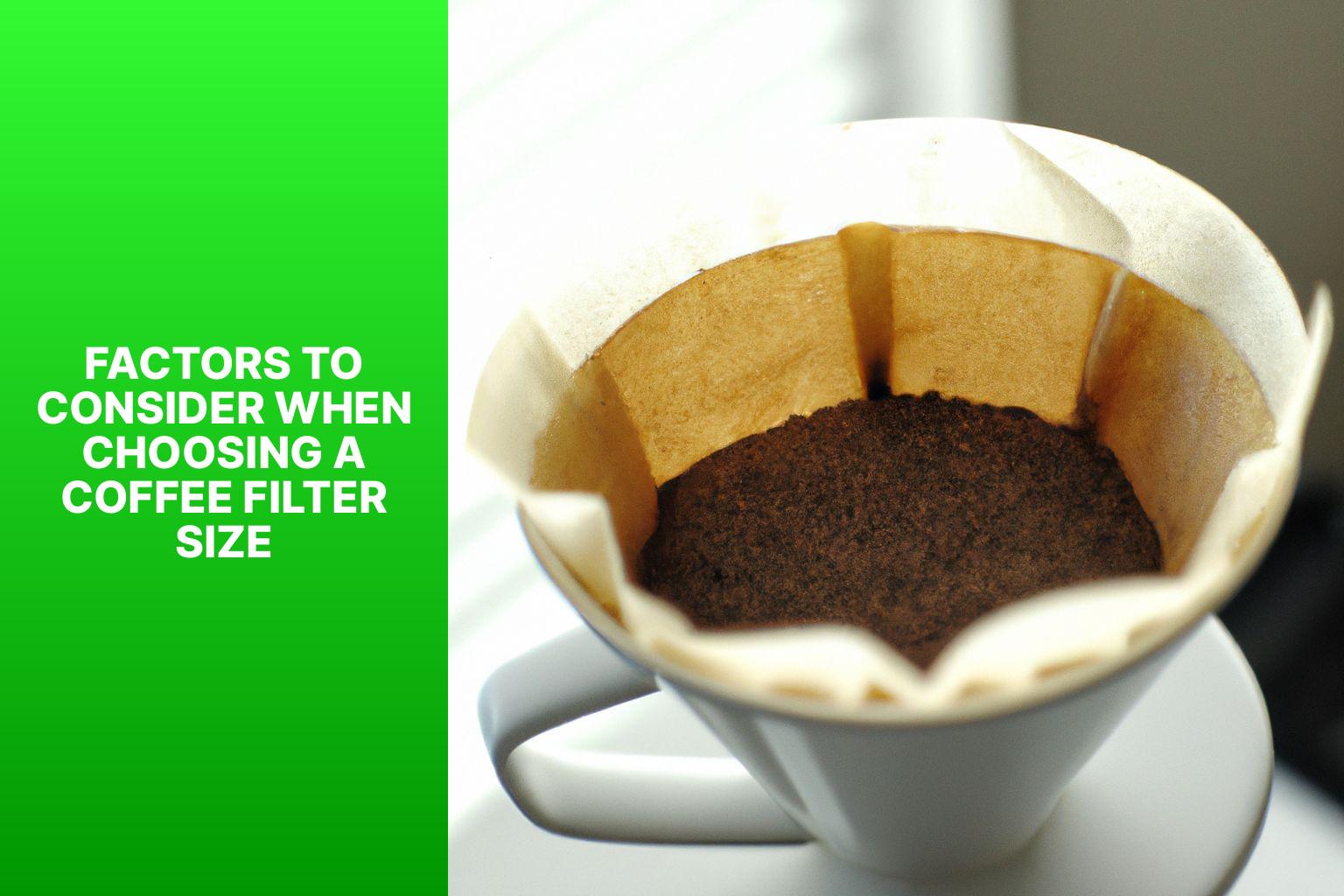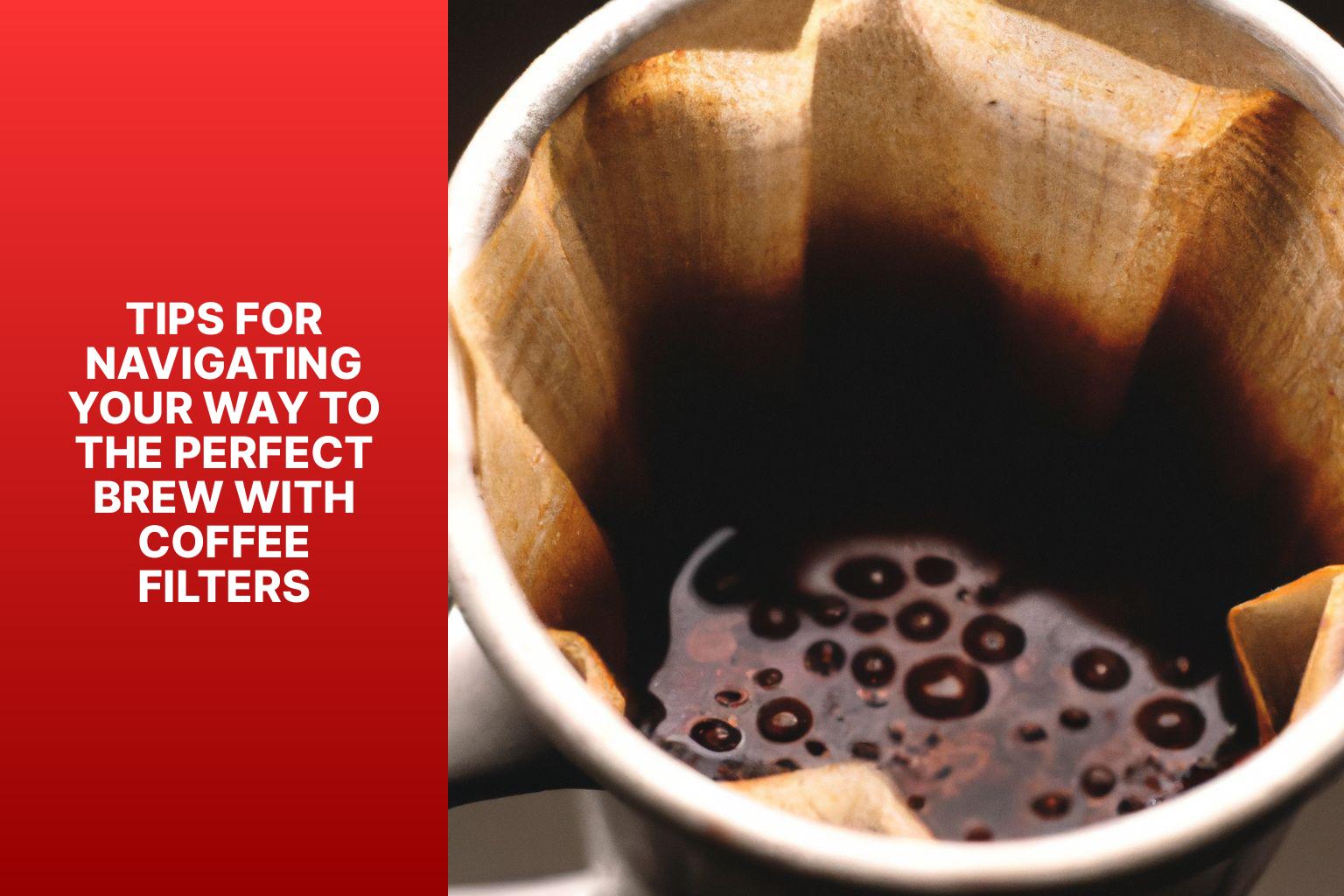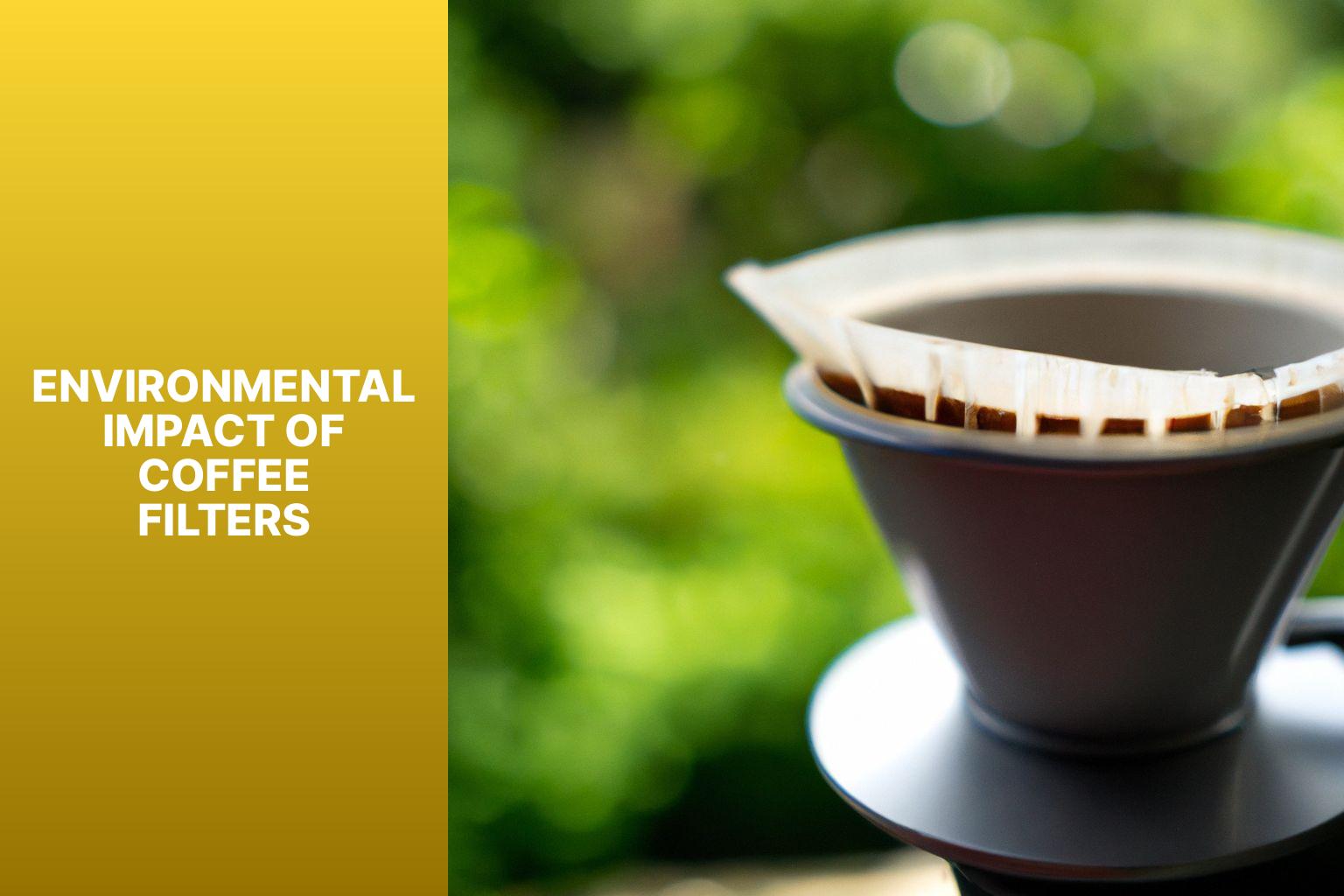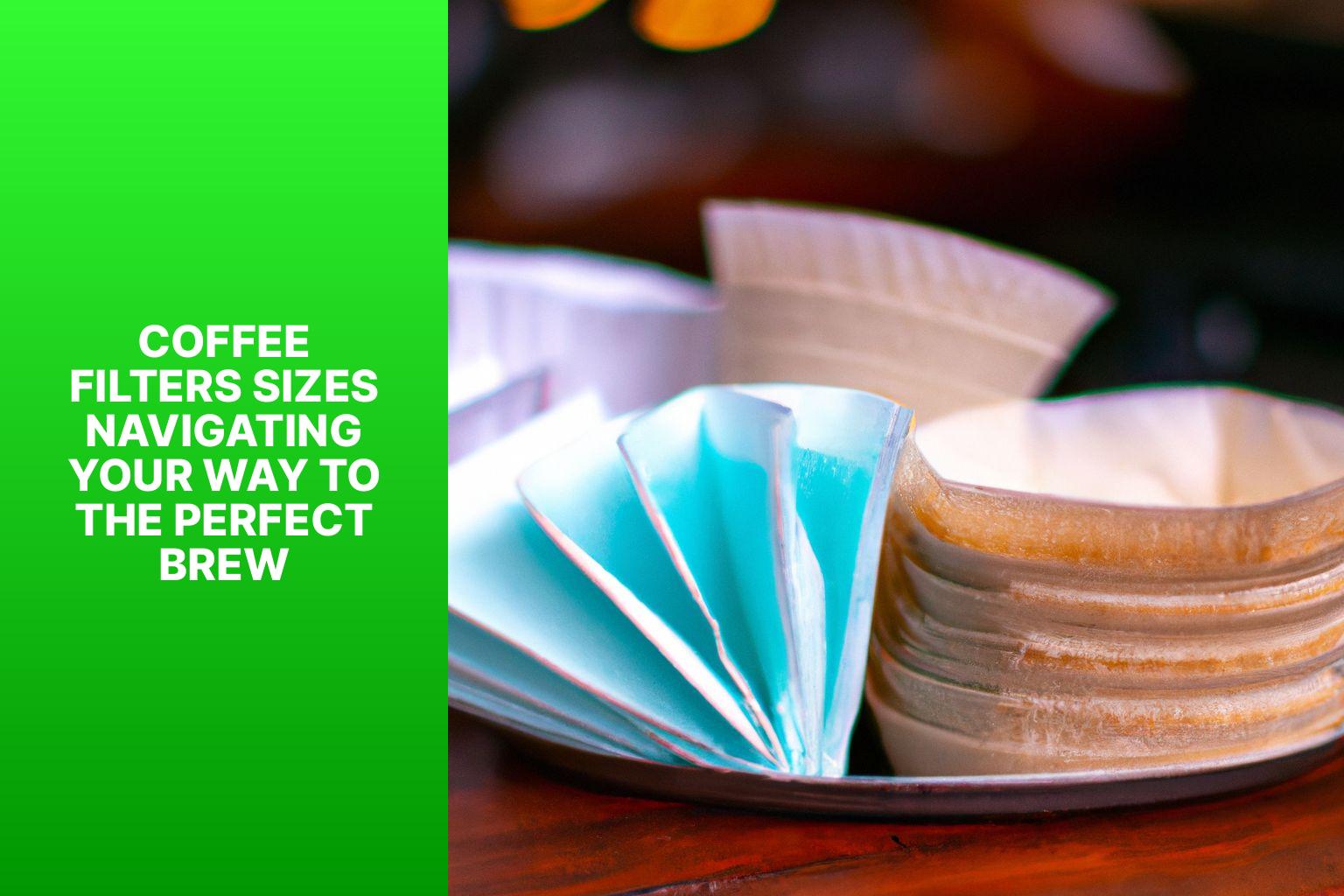Coffee filters
are an essential component of the coffee brewing process, as they help separate the grounds from the brewed liquid. Choosing the right coffee filter size is often overlooked but crucial for achieving the perfect brew. The size of the coffee filter can significantly impact the taste and quality of your coffee.
One of the key aspects to consider when choosing the right coffee filter size is how it affects the taste of your coffee. Different filter sizes can influence factors such as brew time, water flow, and extraction levels, ultimately affecting the flavor profile of your coffee.
There are several different coffee filter sizes available, each with its own specific uses. The most common sizes include Size 1, Size 2, Size 4, and Size 6 coffee filters. Understanding the characteristics and purposes of each size will help you make an informed decision.
When selecting the appropriate coffee filter size, there are various factors to consider. You need to consider your preferred coffee brewing method, as different methods require different filter sizes. Consider the brew capacity you require. If you’re brewing a larger quantity of coffee, a larger filter size may be necessary. Personal preference plays a role, as some individuals may prefer a stronger or milder brew, which can be influenced by the filter size.
To navigate your way to the perfect brew with coffee filters, consider these tips. Experiment with different filter sizes to find your preferred flavor profile. Pay attention to the brewing ratio and adjust the amount of coffee grounds accordingly. Be mindful of the extraction time and water temperature to ensure optimal results.
By understanding the importance of choosing the right coffee filter size and following these guidelines, you can enjoy a consistently delicious and satisfying cup of coffee every time.
Why is Choosing the Right Coffee Filter Size Important?
Choosing the right coffee filter size is important for a few reasons. The filter size determines the amount of coffee grounds used, which affects the strength and flavor. Using a small filter can result in weak coffee, while a large filter can lead to bitter, over-extracted coffee. The filter size also impacts brewing time. A small filter brews quickly, while a large filter takes longer. The right filter size ensures consistent saturation and extraction of the coffee grounds for optimal brewing conditions.
True story: When I first started brewing coffee at home, I didn’t pay attention to the filter size. My coffee tasted weak and lacked flavor compared to the coffee shop. A friend suggested trying a larger filter size, and it made a difference. Using a larger filter, I increased the amount of coffee grounds and achieved a stronger, more flavorful brew. Since then, I always choose the right coffee filter size for a better brewing experience.
How Does the Size of the Coffee Filter Affect the Taste of Coffee?
The taste of coffee is influenced by the size of the coffee filter. The amount of water that comes into contact with the coffee grounds is dependent on the filter size. When using a smaller filter size, less water passes through the grounds, resulting in a stronger flavor. On the other hand, a larger filter size allows for more water to pass through, leading to a milder taste.
In addition to taste, the brewing time is also affected by the filter size. Smaller filters have a shorter brewing time, which produces a lighter and less bitter taste. Conversely, larger filters may require a longer brewing time to enhance flavor extraction, resulting in a fuller-bodied taste.
It is essential to select the appropriate filter based on personal preference and desired coffee intensity. For a strong flavor, it is recommended to use smaller filters, while larger filters are better suited for achieving a milder taste. By considering these factors, you can achieve the perfect brew that aligns with your preferences and brewing method.
From small and cute to big and bold, coffee filter sizes come in all shapes and brews – just like our personalities.
Different Coffee Filter Sizes and Their Uses
When it comes to coffee filters, size matters! In this section, we’ll take a deep dive into the world of different coffee filter sizes and their uses. From size 1 to size 6, each filter size brings its unique characteristics that can greatly impact the taste and quality of your brew. Get ready to explore the fascinating realm of coffee filter sizing and discover the perfect fit for your brewing needs!
Size 1 Coffee Filters
Size 1 coffee filters are indispensable when it comes to making a single cup of coffee. When using size 1 filters, there are a few things to consider. These filters are designed specifically for small coffee makers and single-serve machines. They hold just the right amount of grounds for one serving, making them convenient and economical. Not only do they save you money by eliminating waste when brewing only one cup, but their smaller size also reduces overall waste compared to larger filters. Using size 1 coffee filters is incredibly easy. All you have to do is place the filter in the coffee maker, add your grounds, and voila! You’ll have a delicious cup of coffee ready to be enjoyed. It’s worth noting that coffee filters, including the size 1 variety, have come a long way since their invention in the early 1900s by the German housewife, Melitta Bentz. Her goal was to brew coffee without having grounds in the cup, and her invention completely transformed the brewing process. Nowadays, coffee filters are available in various sizes to accommodate different preferences and requirements. So if you’re looking for a hassle-free and efficient way to enjoy a perfect cup of coffee, make sure to have some size 1 coffee filters on hand.
Size 2 coffee filters, perfect for those who like their coffee like their exes – a little bitter and full of regret.
Size 2 Coffee Filters
Size 2 coffee filters, ideal for brewing coffee, offer numerous benefits for coffee enthusiasts. Here are the key points to consider when using size 2 coffee filters.
1. Size: Size 2 coffee filters have a diameter of typically 2.5 to 3 inches, making them perfect for individuals or small households.
2. Brew Capacity: These filters are designed to fit smaller coffee makers that brew up to 4 cups of coffee. With their ideal size, they provide ample space for the grounds to steep and extract flavors.
3. Filter Material: Size 2 coffee filters are crafted from high-quality, oxygen-bleached paper or other eco-friendly materials. This ensures a clean and flavorful brew, enhancing the overall coffee experience.
4. Ease of Use: Handling and disposing of these filters is remarkably convenient. They easily fit into compatible coffee filter holders or drippers, guaranteeing a hassle-free brewing process.
Pro-tip: For the best results when using size 2 coffee filters, it is recommended to grind your coffee beans to a medium-coarse consistency. This allows for optimal water flow and extraction, resulting in a perfectly balanced and delicious cup of coffee. Feel free to experiment with different coffee-to-water ratios and brewing techniques to find your preferred brew using size 2 coffee filters.
Size 4 Coffee Filters
Size 4 coffee filters are larger than size 1 and size 2 filters. They can handle 8-12 cups of coffee. Size 4 coffee filters allow water and coffee grounds to interact and extract flavors effectively. They are commonly used in large drip machines and pour-over brewers. Consider your brewing method when choosing a size 4 coffee filter.
Size 4 coffee filters are great for larger households or brewing a larger volume of coffee. They work well with both coarse and fine coffee grounds. Size 4 coffee filters are readily available in grocery stores and online. Using the correct size coffee filter enhances the taste by extracting properly and preventing grounds from getting into the brew.
Size 6 Coffee Filters
Size 6 coffee filters are specifically designed for use with larger coffee makers or brewing systems that have a higher brew capacity. When using size 6 coffee filters, there are a few important factors to consider.
It is essential to check the specifications of your coffee maker to ensure compatibility with size 6 filters. This step ensures that the filter will fit perfectly and function effectively in your coffee maker.
Secondly, size 6 filters are ideal for brewing larger quantities of coffee. Their capacity allows you to brew more coffee at once, making them perfect for situations where you require a greater quantity of coffee.
Using the correct size filter plays a significant role in achieving efficiency in coffee brewing. When the filter size is appropriate, it ensures even water distribution over the coffee grounds, resulting in the extraction of the full flavor. This is crucial in achieving a well-balanced and satisfying cup of coffee.
In terms of taste, the size of the coffee filter can also impact the flavor profile. A larger filter provides a longer contact time between the water and the coffee grounds. This extended contact time allows for better flavor extraction, resulting in a more robust and flavorful cup of coffee.
Using the right size filter also offers the convenience of minimizing the risk of overflow or grounds getting into your coffee. This is especially important when brewing larger quantities of coffee, as the chances of encountering such issues can increase.
When choosing a coffee filter size, it is essential to consider compatibility, brew capacity, and desired taste. By selecting the appropriate size 6 coffee filter, you can ensure a consistently delicious cup of coffee every time you brew.
When it comes to choosing a coffee filter size, remember to think about your brew method, brew capacity, and your personal preference – it’s like finding the perfect filter-fitting pair of jeans.
Factors to Consider When Choosing a Coffee Filter Size

Photo Credits: Theimperfectcafe.Com by Benjamin Torres
When it comes to finding the perfect brew, choosing the right coffee filter size can make all the difference. In this section, we’ll explore key factors that should be considered when selecting a coffee filter size. From the brewing method to brew capacity and personal preference, we’ll uncover the important elements that can enhance your coffee experience. So, get ready to unlock the secrets behind choosing the ideal coffee filter size that suits your taste and brewing needs.
Coffee Brewing Method
The coffee brewing method is crucial in choosing the right coffee filter size. Different methods require different filter sizes to achieve the desired taste and strength.
| Brewing Method | Recommended Filter Size |
| Pour Over | Size 2 or Size 4 |
| Drip Coffee Maker | Size 4 |
| French Press | No paper filter required |
| AeroPress | Size 2 |
| Espresso Machine | Size 1 or Size 2 (depending on the portafilter size) |
The right filter size ensures proper extraction of the coffee grounds and enhances flavor. Using the wrong size filter can lead to under-extraction or over-extraction, resulting in a weak or bitter taste.
For coffee brewing method like pour-over, Size 2 or Size 4 filters are recommended. These sizes allow for a slower extraction process, resulting in a full-bodied and flavorful cup. In a drip coffee maker, a Size 4 filter is typically used to accommodate the larger brewing capacity.
Remember, the coffee brewing method is one aspect to consider. Brew capacity and personal preference should also be taken into account to ensure the perfect cup every time.
I once used a Size 1 filter in my pour-over coffee maker instead of Size 2. The result was a weak and watery cup of coffee lacking the bold flavors I wanted. I quickly learned the importance of using the correct filter size for my chosen coffee brewing method.
Brew Capacity
To choose the right coffee filter size, consider brew capacity. Brew capacity refers to the amount of coffee that can be brewed at once. Different sizes have different capacities, so choose the appropriate size for your needs.
Here is a table showing the brew capacity for each coffee filter size:
| Size 1 | 1-2 cups of coffee |
| Size 2 | 2-4 cups of coffee |
| Size 4 | 4-8 cups of coffee |
| Size 6 | 8-12 cups of coffee |
Choosing the right coffee filter size ensures you don’t waste coffee or end up with too little. It allows convenient brewing of the desired amount without hassle.
Pro-tip: Consider a size 2 coffee filter if you frequently make smaller batches. It offers versatility for both smaller and larger brews.
Choosing the right coffee filter size is as important as choosing a partner – you don’t want one that’s too small or too big, just the perfect fit for your brew.
Personal Preference
When it comes to choosing the right coffee filter size, personal preference plays a key role. Some coffee lovers have a preference for a stronger brew, while others enjoy a milder taste. The size of the coffee filter can have an impact on the flavor of your coffee.
If you prefer a stronger flavor, it is advisable to use a smaller coffee filter size such as size 2 or size 4. These smaller filters facilitate a slower extraction process, which results in the extraction of more oils and flavors from the coffee grounds.
On the other hand, if you prefer a milder taste, using a larger coffee filter size like size 6 is recommended. The larger filter allows the water to flow more freely through the coffee grounds, resulting in a faster extraction and a lighter flavor.
Experimentation is crucial in determining the coffee filter size that best suits your personal taste. Regardless of whether you prefer your coffee strong or mild, choosing the right filter size can enhance your coffee-drinking experience and allow you to customize each cup to your liking.
It is also worth noting that the size of the coffee filter can affect the level of sediment in your coffee. Smaller filters produce a cleaner cup with less sediment, while larger filters may let more sediment pass through.
Navigate your way to the perfect brew with coffee filters and avoid any grounds for disappointment.
Tips for Navigating Your Way to the Perfect Brew with Coffee Filters

Photo Credits: Theimperfectcafe.Com by Jeremy Lee
When it comes to brewing coffee, it’s important to consider various factors, including the type and size of the coffee filter you use. To help you find the perfect brew, here are some helpful tips for navigating your way to the ideal cup with coffee filters:
1. Choose the right size: It’s crucial to select a coffee filter that fits perfectly in your coffee maker. With different coffee makers requiring various filter sizes, it’s best to consult the manual or packaging to determine the correct size.
2. Consider the material: Coffee filters can be crafted from different materials like paper, cloth, or even metal. While paper filters are commonly used and convenient, using reusable filters made from cloth or metal is a more sustainable choice.
3. Ensure proper placement: When using a paper filter, make sure it is correctly positioned in the coffee maker. Incorrect placement can result in water bypassing the coffee grounds and negatively impacting the flavor of your brew.
4. Pay attention to filtration level: Coffee filters come in different filtration levels, which directly affect the flavor and strength of your coffee. If you prefer a bolder flavor, opt for filters with larger pores that allow more oils and flavors to pass through.
5. Experiment with different brands: Just like coffee beans, different coffee filter brands offer subtle differences in terms of their filtering capabilities and materials used. Don’t hesitate to try out various brands to find the one that best aligns with your taste preferences.
By incorporating these helpful tips into your coffee-making routine, you’ll be able to maximize the potential of your coffee filters and consistently brew the perfect cup every time.
Types of Coffee Filters: Disposable and Permanent Filters
Coffee filters play a crucial role in brewing that perfect cup of joe. In this section, we’ll explore the different types of coffee filters: disposable and permanent filters. Discover the pros and cons of each, as we uncover which one suits your brewing preferences and lifestyle. So grab your favorite blend, because we’re about to dive into the world of coffee filters and find the one that helps you savor every sip.
Disposable Coffee Filters
Disposable coffee filters are an essential component when it comes to brewing your favorite cup of coffee. To ensure that you make the perfect brew, it is crucial to consider several key factors.
Firstly, make sure to choose a filter size that matches your coffee maker. Whether it is size 1, size 2, size 4, or size 6, selecting the correct size will guarantee a seamless fit.
Next, ensure that the chosen filter is compatible with your specific coffee maker. Different coffee makers have different specifications, so it is important to check for compatibility.
Additionally, the brewing method you prefer plays a significant role in filter selection. Whether you enjoy the convenience of a drip machine, the artistry of pour-over brewing, or the robustness of the French press, selecting a filter designed for your brewing method is essential.
Furthermore, the quality of your filter greatly impacts the taste of your coffee. Look for filters that provide excellent filtration to prevent any unwanted coffee grounds from finding their way into your cup. Opting for high-quality filters made from unbleached or oxygen-bleached paper will maintain the rich and delicious taste of your coffee.
So, when it comes to finding the perfect disposable coffee filters for your brewing needs and preferences, consider these factors. Your morning cup of coffee will thank you!
Permanent Coffee Filters
When it comes to coffee filters, permanent coffee filters have numerous advantages over disposable ones. Here are some compelling reasons why permanent coffee filters are an excellent choice:
1. Eco-friendly: Permanent coffee filters are reusable, reducing waste and minimizing their environmental impact, unlike disposable filters.
2. Cost-effective: By investing in a permanent coffee filter, you can save money in the long run since you won’t need to continually purchase disposable filters.
3. Enhanced flavor: Permanent filters, often constructed from stainless steel or gold-plated mesh, allow more oils and flavors to pass through compared to paper filters. As a result, you can savor a richer and more robust coffee taste.
4. Easy to clean: Permanent coffee filters are typically dishwasher-safe or can be effortlessly cleaned by hand with soap and water. This ensures hassle-free maintenance and convenience.
5. No pre-rinsing needed: Unlike paper filters, permanent filters don’t require rinsing before use to eliminate residue or taste. By using permanent filters, you can save time and water by skipping this step.
Considering these factors, permanent coffee filters provide a sustainable, economical, and flavorful option for coffee enthusiasts. They offer convenience, help reduce waste, and allow for a full extraction of flavors from coffee grounds.
Environmental Impact of Coffee Filters

Photo Credits: Theimperfectcafe.Com by Lawrence Rodriguez
Using coffee filters can have a significant environmental impact. Coffee filters, which are typically made from paper, contribute to deforestation and the production of carbon emissions and water pollution. Many coffee filters are not biodegradable and end up in landfills, further contributing to environmental degradation.
To minimize the environmental impact of coffee filters, consider the following suggestions. First, opt for reusable coffee filters made from stainless steel or cloth. These filters can be easily washed and used multiple times, eliminating the need for disposable paper filters. Second, look for environmentally-friendly alternatives like compostable coffee filters made from bamboo or hemp. These filters naturally break down, reducing waste. Explore brewing methods that do not require filters, such as French press or espresso machines with built-in filters.
By consciously choosing the type of coffee filter you use, you can help mitigate the environmental impact associated with your daily caffeine fix.
Coffee Filters Sizes: Navigating Your Way to the Perfect Brew:
- ✅ Choosing the right coffee filter depends on the brewing method and size of your coffee maker. (Source: https://www.roastycoffee.com/coffee-filter/)
- ✅ Coffee filters come in different sizes including #1, #2, #4, and #6, each suitable for specific coffee makers. (Source: https://www.thecommonscafe.com/essential-guide-to-finding-the-right-size-4-coffee-filter-for-your-coffee-maker/)
- ✅ The size of the coffee filter can affect the taste of the brew, with size 2 filters yielding a crisper, cleaner cup and size 4 filters offering a fuller-bodied, robust flavor. (Source: https://thecoffeeguru.net/coffee-filter-2-vs-4-the-ultimate-comparison-for-finding-the-perfect-fit/)
- ✅ Paper, metal, and cloth are the three main types of coffee filters, each with its own advantages and characteristics. (Source: https://www.roastycoffee.com/coffee-filter/)
- ✅ The choice between cone and flat coffee filters depends on personal preference, with conical filters bringing out deeper flavors and flat filters resulting in a sweeter taste. (Source: https://www.roastycoffee.com/coffee-filter/)
Frequently Asked Questions
What is the purpose of coffee filters?
Coffee filters serve the purpose of separating coffee grounds from the liquid brew and extracting flavor. They effectively filter out grounds and sediment, resulting in a smoother and cleaner cup of coffee.
What are the different types of coffee filters available?
There are three main types of coffee filters: paper, metal, and cloth. Paper filters are the most common and come in bleached and unbleached versions. Metal filters, made of stainless steel or aluminum, don’t absorb coffee oils and can last a lifetime. Cloth filters, made of organic cotton, linen, or hemp, filter out all coffee particles but can be more difficult to maintain.
Which coffee filter size should I choose?
The choice of coffee filter size depends on your brewing needs and preferences. Size 2 filters are typically suitable for smaller brews, while size 4 filters are ideal for larger quantities. It is crucial to check the compatibility of the filter size with your coffee maker.
What factors should I consider when selecting the right coffee filter size?
When selecting the right coffee filter size, you should consider brewing volume, coffee maker compatibility, and flavor preference. Size 4 filters are larger than size 2 filters, allowing for more grounds and a stronger cup of coffee. Size 2 filters, on the other hand, offer a crisper and cleaner taste.
What are the pros and cons of using cloth coffee filters?
Cloth coffee filters, made of organic cotton, linen, or hemp, have the advantage of filtering out all coffee particles and producing a middle-ground taste. They can be more difficult to maintain and may retain flavors from previous brews.
Are there alternatives if I run out of coffee filters?
If you run out of coffee filters, there are alternatives available. For example, you can use a metal filter, which doesn’t absorb coffee oils but may let micro-grounds seep into the cup. It is recommended to use the appropriate coffee filter size for the best brewing experience.

